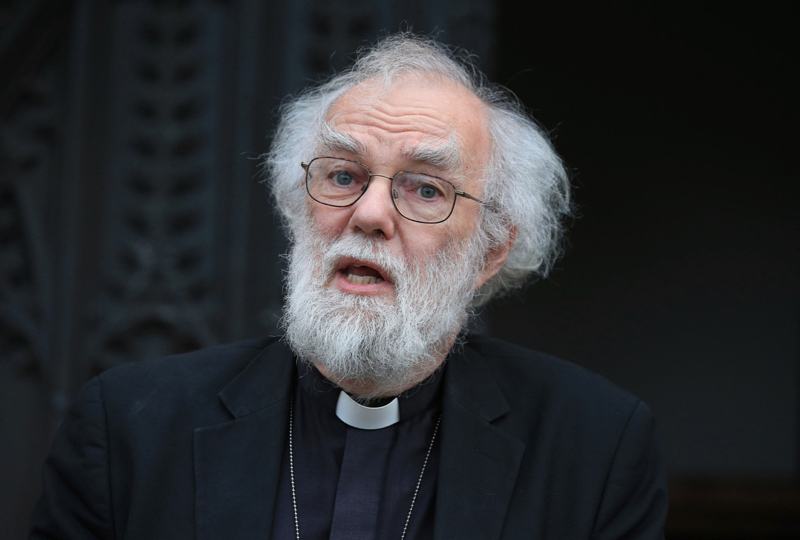The former Archbishop of Canterbury, Lord Williams of Oystermouth, has questioned the screening standards for government advisers in the wake of the resignation of Andrew Sabisky over past controversial comments.
Speaking to The Tablet in Dublin, Lord Williams rejected 27-year-old Sabisky’s claim that he was the victim of “character assassination”.
The Downing Street adviser stood down on Tuesday after details emerged of his views on race, eugenics and women.
The former leader of the Church of England called for Sabisky to "repudiate" his past online comments and suggested that the former defence contractor was “quite clearly” an “extremely disturbing influence”.
“I think the underlying question is what sort of screening is there for people coming in to work for government. Do people adequately look at their background?” he said.
Andrew Sabisky was hired following Dominic Cummings, Prime Minister Boris Johnson’s chief adviser’s call for “misfits and weirdos” to apply for jobs in Downing Street.
Asked if he would like to like to see Prime Minister Boris Johnson say something more forthright about Sabisky’s views, Lord William responded: “Yes, I would.”
He also criticised the role of special advisers jibing that it “reinforced the sense that politics is a profession you can take up at the age of 13” and that “you don’t really need experience of other sorts of decision-making, or sorts of collaborative working. I think we are the poorer for that. I think we need more people who have more experience outside politics.”
At the Church of Ireland Theological Institute in Dublin, Lord Williams spoke on the theme, "Faith in Democracy?"
In his address, he said it is “crucial for a democracy to be liberated from the idea that majority votes end arguments”.
He regretted how the rhetoric of public argument these days seems to buy into the enemy rather than opponent model.
“There are an increasing number of issues about which it seems to be impossible to have the kind of mutually recognising disagreement. And this is a threat to democracy in the sense that it subtly feeds the idea that what is needed in a democracy is a once and for all victory. Not only must I win the argument with a sufficient number of people to get legislation passed or rescinded, I must silence the argument.”
He said this was “extremely bad for democracy” and warned: “That is what we are on the edge of culturally and politically in very many contexts today.”
Asked by the Tablet if he was concerned about democracy in Britain, Lord Williams said he was concerned about how you restore to lots of communities a sense of some control over their lives and a sense of some real involvement. He noted people’s sense of disenfranchisement which had been a factor in the referendum on the EU and the general election.
“So, what are we going to do? Are we going to just promise that the centre will be nicer to the fringes or are we going to say, how do we restore real decision-making capacity to local communities? How do we rebuild local government, civic government, city mayors and all these things which draw people together?”
He cited a recent city-wide consultation on homelessness in Cambridge which drew together business, churches, charities, homeless people and local government “on the grounds that we all had to be involved in discerning ways forward. I think that is the model that we really have to work at,” Lord Williams said.
Asked about the introduction of abortion legislation in Ireland following the passing a referendum to repeal the Eighth Amendment in 2018 and the Irish government’s assertion that the matter had been dealt with, Lord Williams said: “I worry when a decision like that is seen as simply putting a tombstone on the discussion.”
In his lecture he stressed that “majority votes do not decide what is right. They decide what is lawful. They decide what the majority of people can live with and to some extent respect, even if they don’t agree.” In a democracy, ongoing discussion was essential, he said.
Democracy, Lord Williams highlighted, is a system in which every voice has a claim to be heard. “That doesn’t mean that decisions are impossible. What it does mean is that decisions can be challenged. So, a democratic decision may be taken by a majority vote but that does not of itself make it irreformable or unchallengeable, let alone right.”
Speaking to The Tablet, Lord Williams said that on the issue of abortion, there were people in the UK who would like to push the matter to the point where it is no longer discussable.
“It does seem to me we have to continue to challenge some of the assumptions that are thrown around. To put my cards on the table, I’m a conservative on the question of abortion overall, I worry about the ending of human life.” He stressed that it was “not a trivial question”.
On Brexit, Lord Williams admitted he was a Remainer.
“I think we moved very quickly in the UK to saying there has been a referendum result, that is now the democratic decision.” He said he had been worried by some of the language that had been used in the debates such as the reference to ‘enemies of the people’ and that ‘we’ have decided.
“That gave me a tiny insight into what it is like to be a racial minority where ‘the people’ is somebody else. Where ‘we’ is somebody else.
“Whatever one’s views on the Brexit issue, that kind of thing really corrodes democracy because it assumes that the minority has really stopped being there and in almost every significant decision and debate you have a minority which is not going to disappear overnight.”



 Loading ...
Loading ...